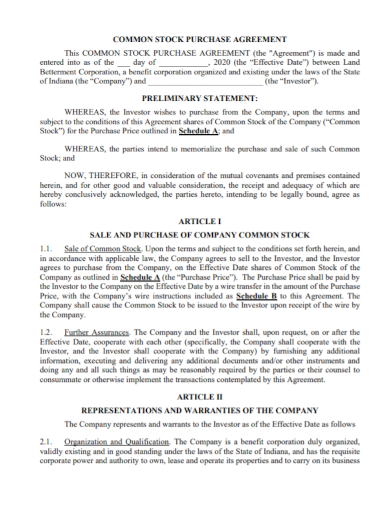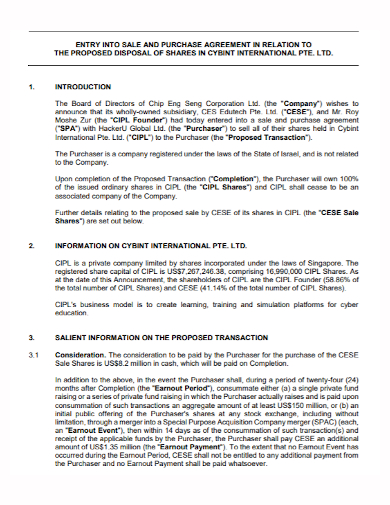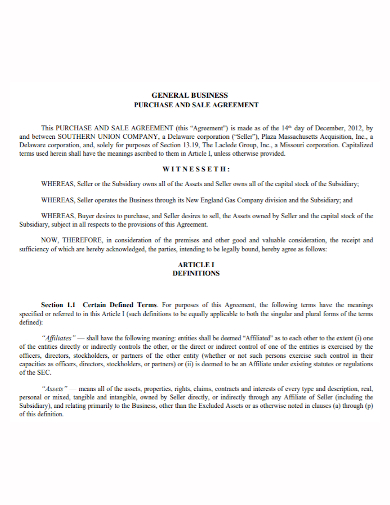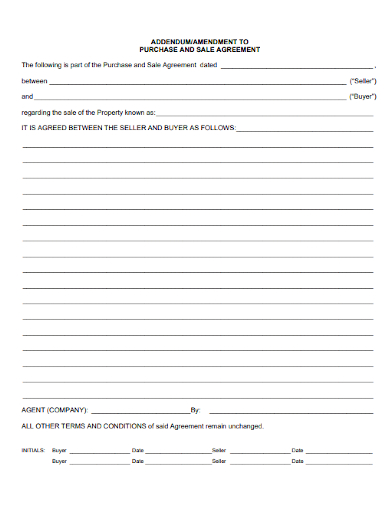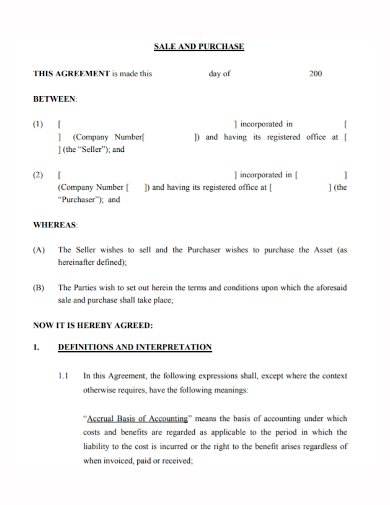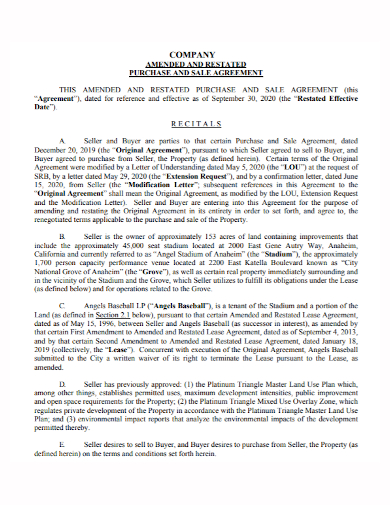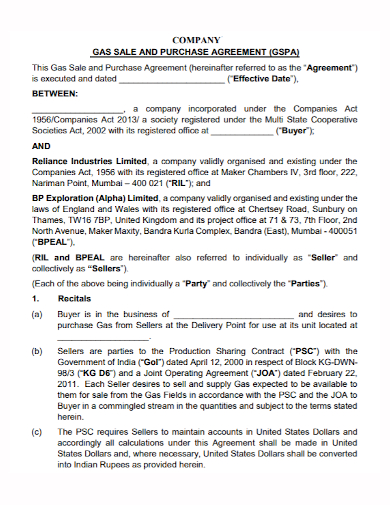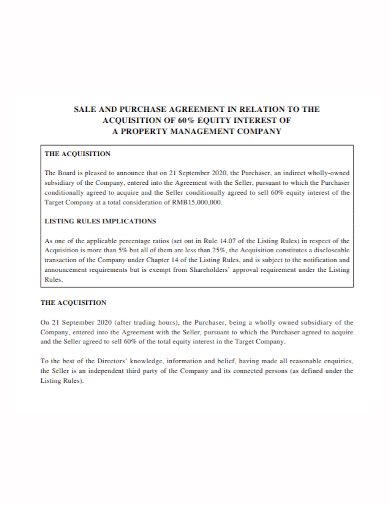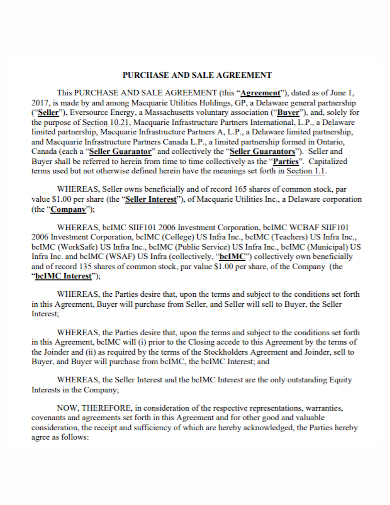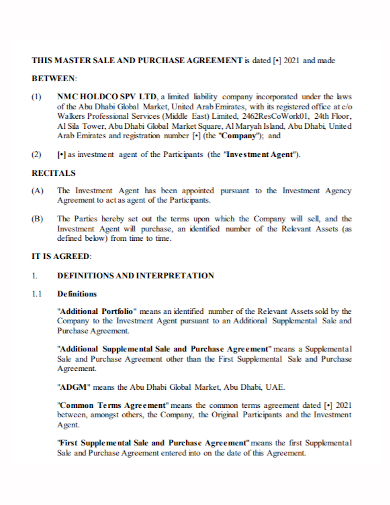A sales and purchase agreement (SPA) is a legally enforceable contract that binds a buyer and seller to a transaction. SPAs are most commonly found in real estate transactions, but they can also be found in other industries. The agreement is the result of the buyer and seller’s negotiations, and it establishes the sale’s terms and conditions.
10+ Company Sale and Purchase Agreement Samples
Before a transaction can take place, the buyer and seller must agree on the price of the item to be sold as well as the transaction’s terms. The SPA serves as a framework for negotiations. The SPA is frequently used when making a large purchase, such as real estate, or making multiple purchases over time. SPAs also include extensive information about the buyer and seller. As negotiations progress, the agreement records any deposits made and notes parts of the agreement that have already been met. The agreement also specifies the date of the final sale.
1. Company Sale and Purchase Agreement Template
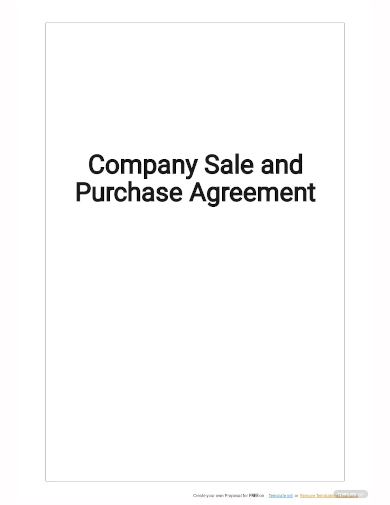
2. Company Stock Sale and Purchase Agreement
3. Company Purchase and Sale of Shares Agreement
4. Company Business Purchase and Sale Agreement
5. Amendment to Purchase and Sale Company Agreement
6. Company Sale and Purchase Agreement
7. Company Restated Sale and Purchase Agreement
8. Company Gas Sale and Purchase Agreement
9. Company Property Sale and Purchase Agreement
10. Sample Company Sale and Purchase Agreement
11. Company Master Sale and Purchase Agreement
Structuring Sale and Purchase
- Should we buy/sell the shares/assets of the company? – The business of a company can be acquired in one of two ways:
-By purchasing stock in the corporation that owns the business (a share sale). The sellers in this case are the company’s shareholders, who will sell their shares to the buyer.
-By purchasing the company’s assets, which make up the business (a business or asset sale). The seller in this case is the company, which will sell some or all of its assets to the buyer.The majority of acquisitions are structured as stock sales, but there are a number of factors that can influence which structure is used. Before a business or company is sold, it may be necessary to restructure it in order for it to be acquired in the most efficient manner. - Tax – The buyer and seller’s tax implications often drive the structure of a transaction. When it comes to achieving the best possible tax result, their interests may be at odds. This guide does not cover the various tax consequences of a deal because it is a complex area that is dependent on the specific circumstances of the parties. However, where the seller is an individual, a share sale is more likely to avoid a potential double tax charge – an initial tax charge on the company at the time of asset sale to the buyer and a second tax charge on the company’s shareholders when they withdraw the sale proceeds from the company.
- Assets and liabilities – When a company sells its shares, the buyer gets the company “warts and all,” including all of its assets, liabilities, and obligations. In general, this route provides a cleaner break for sellers because they will no longer be directly responsible for the company after the sale; any remaining liability will be owed to the buyer under the terms of the warranties and indemnities agreed in the sale and purchase agreement.Only the assets and liabilities that the buyer expressly agrees to purchase are acquired in a business sale; everything else remains with the company. If the buyer suspects the company has unknown liabilities or is concerned about any aspect of the business, it may prefer to structure the transaction as a business sale, which allows it to “cherry-pick” from the company’s assets and liabilities and take on only the risks it understands and finds acceptable.
- Practicalities – In general, there are more practical and commercial issues to deal with when selling a business than when selling stock. Only the owner of the company’s shares is transferred in a share sale. While the company’s shareholders will change, the company’s assets (such as business contracts, agreements, and licenses) will remain with the company. From the outside, little will appear to have changed, and customers and suppliers will usually be content to do business with the company as usual. When a change of ownership of the company is planned, certain contracts (for example, financing contracts and other long-term agreements) may require the consent of the other party. It’s critical to spot any such agreements early on in the process.When a business is sold, all of the assets and contracts of the company must be transferred to the buyer, and the consent of customers, suppliers, landlords, licensors, and others is more likely to be required. Contracts, agreements, land, and property, as well as certain intellectual property rights, will all need to be transferred in writing. There will most likely be more disruption to the business than with a stock sale, and the buyer may need to establish trust with the company’s customers and suppliers in order to keep existing trading relationships.
- Employees and pensions – The TUPE regulations will almost certainly apply. If this is the case, the employees’ current employment terms will automatically transfer to the buyer, and the buyer will become their employer. Buyers and sellers should be aware that they will have specific obligations to notify employees about their plans, and that they may need to consult with employees prior to the sale’s completion. A share sale does not result in a change of employer; employees remain with the target company. When buying or selling a target company or business, buyers and sellers should be aware of the pension implications. This is a complicated area with a lot of potential liabilities and obligations, especially in the context of final salary schemes.
FAQs
Why are businesses bought and sold?
- to expand market share
- in order to obtain new technology or designs;
- diversification;
- to quickly enter new markets;
- to seize power over valuable assets or resources
What is asset share/asset purchase?
Asset Purchase/Sale – when an individual or company purchases a company’s trading assets. If the seller is a corporation, the assets would be sold off first, with the corporation remaining at the end to be wound up.
If you want to see more samples and formats, check out some company sale and purchase agreement samples and templates provided in the article for your reference.
Related Posts
FREE 10+ Mentoring Agreement Samples In MS Word | Apple Pages | PDF
FREE 10+ Partner Agreement Samples In MS Word | Google Docs | Apple Pages | PDF
FREE 10+ Individual Agreement Samples In MS Word | Google Docs | Apple Pages | PDF
FREE 10+ Strategic Agreement Samples In MS Word | Google Docs | Apple Pages | PDF
FREE 10+ Equity Agreement Samples In MS Word | Google Docs | Apple Pages | PDF
FREE 10+ Producer Agreement Samples in MS Word | Apple Pages | PDF
FREE 10+ Grant Agreement Samples In MS Word | Apple Pages | PDF
FREE 8+ Meeting Agreement Samples in MS Word | Google Docs | Apple Pages | PDF
FREE 10+ Community Agreement Samples In MS Word | Google Docs | PDF
FREE 8+ Real Estate Option Agreement Samples in MS Word | PDF
FREE 10+ Call Option Agreement Samples In MS Word | PDF
FREE 10+ Advertising Agreement Samples In MS Word | Google Docs | Apple Pages | PDF
FREE 10+ Car Agreement Samples In MS Word | Google Docs | Apple Pages | PDF
FREE 10+ Horse Agreement Samples In MS Word | Apple Pages | PDF
FREE 10+ Option Agreement Samples In MS Word | Google Docs | Apple Pages | PDF

